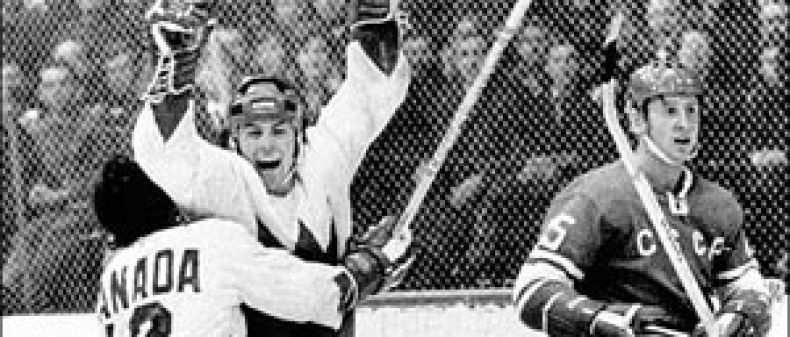
“Henderson has scored for Canada!” Is there a more famous, more celebrated line in the annals of Canadian history? I think not. While the legendary Foster Hewitt made the call, it was one Paul Henderson who brought it to fruition, the Canadian hero who has inexplicably yet to be recognized for hockey’s greatest honour.
It was the 1972 Summit Series between Canada and the Soviet Union. The Canadians were an overconfident bunch, certain they would make short work of the Soviets. Yet, to their credit, the Soviets, led by 23-year-old phenom Valeri Kharlamov up front and a quick, intimidating 20-year-old in goal by the name of Vladislav Tretiak, gave Canada a serious run for their money.
While hockey fans across this great nation celebrate the 40th anniversary of arguably the most iconic moment in Canadian sports history, I feel inclined to bring to the surface an argument that has had a shelf life just as long as his memorable goal four decades earlier: Should Paul Henderson be inducted into the Hockey Hall of Fame?
While many argue that Henderson’s NHL career was modest at best, he can’t be blamed for playing for some hapless clubs including the Detroit Red Wings of the late-60s, the Leafs of the early-70s and, after a stint in the World Hockey Association, spending the 1979-80 season with a lowly Atlanta Flames club who were just months away from migrating north to Calgary. In 12 NHL seasons, Paul Henderson amassed 276 goals and 477 points. While those aren’t considered Hall of Fame-calibre numbers, perhaps Henderson, a native of Kincardine, Ontario, should be given an enormous exception.
When the series began, what was supposed to be a walk in the park turned into catastrophe. The first four games of the series were played in Canada with the Soviets holding a 2-1 advantage to go along with a 4-4 tie in Game 3. Game 4 in Vancouver looked to be the turning point of the series as the Soviets drubbed Canada by a score of 7-3 with Canadian fans booing their own team off the ice.
After dropping Game 5, the Canadians found themselves just one loss away from losing the series and, in the bigger picture, hockey supremacy. But the level of intensity rose a few notches for the remainder of the series.
After dominating the Canadians for much of the series thus far, Valeri Kharlamov became a target for Team Canada. After getting under the skin of a few of the Canadian players, forward Bobby Clarke strode in behind a streaking Kharlamov and deliberately slashed his ankle, fracturing it in the process. While Kharlamov did play the remainder of the game, he was sidelined for Game 7 and ineffective in Game 8.
With Game 6 tied 2-2 in the middle frame, Paul Henderson put Canada ahead with what proved to be the game-winning goal and left Canada to fight another day.
In Game 7, with the game tied at three apiece in the third, it was Henderson breaking the deadlock again with a highlight-reel goal he was able to score while he was down. Like Game 6, Henderson’s tally stood as the game-winner and the stage was set for an eighth and final, winner-take-all game two nights later.
It was September 28, 1972 at the Luzhniki Ice Palace in Moscow with both teams determined to stop at nothing to win the series. Back in Canada, television sets were wheeled into school gymnasiums while most businesses closed for the day. This day was an unofficial holiday for Canadians who wanted to be there to witness their boys reign supreme despite their overconfidence just a few weeks earlier.
When the game began, Team Canada received a few questionable penalties that got the Canadians up in arms but they were tied 2-2 with the Soviets after the first in spite of those calls. Still, Canadians players were irate over said calls, referees were verbally and nearly physically abused, head coach Harry Sinden threw a chair onto the ice and the two teams spent the evening antagonizing each other.
In the second period, the Soviets began to pull away and at the end of the frame, they were up 5-3. In the third, the Canadians were able to score twice to tie which set the stage for the final minute of play.
With under 40 seconds to go in regulation, Phil Esposito and Paul Henderson both entered the Soviet zone hoping to end the game right then and there. Henderson made a valiant effort to score but fell behind the net. As he was getting up, Esposito desperately kept the puck in play when Henderson, to the surprise of every Soviet on the ice, raced back to the front of the net where he shot at Tretiak before quickly picking up his own rebound and scoring with just 34 seconds to go. The Canadians immediately poured off the bench and goaltender Ken Dryden even raced over to embrace his teammates. The Canadians held on to win the series and more importantly, maintain world bragging rights.
Never before had Canada been challenged by another country at their game and they were certainly pushed to the brink by a younger and some believe a more talented Soviet squad. Yet, with their backs against the wall on enemy soil, seldom-heralded Paul Henderson took it upon himself to make the difference scoring the game-deciding goals in the final three games to give Team Canada the series. It was good versus evil… and the good guys prevailed.
Yet, despite his impact not only on the series but Canadian hockey for the next forty years, Paul Henderson is not in the Hockey Hall of Fame. Everything about that famous goal is recognized at hockey’s ultimate shrine except for the player himself.
With all due respect to the aforementioned Valeri Kharlamov, he was inducted in the Hall in 2005 despite never playing a single shift in the National Hockey League. While playing in the NHL was unheard of for Russians during his playing days, Kharlamov did have an illustrious career where was recognized for what he did to a large extent in international competition. Playing professionally in Russia, Kharlamov racked up 273 career goals (three fewer than Henderson’s NHL total) and 477 career points (six fewer than Henderson’s total). Perhaps it was Henderson’s decision to play in the rival WHA that dissuaded voters from inducting him but Bobby Hull, the ringleader of said league, was inducted in 1983 despite being barred by the NHL for helping to create the WHA just over a decade earlier. In fact, it was because of his defection to the new league that Hull wasn’t allowed to play in the Summit Series.
How is it that Kharlamov is in the Hall for what he contributed to Soviet hockey, Herb Brooks is in for what he contributed to the USA hockey yet Henderson is on the outside looking in despite what he did for Canadian hockey? It may have been just a goal but on one February afternoon in 1980, Mike Eruzione scored a goal to put Team USA up late against the Soviets and, like Henderson’s tally eight years earlier, stood as the game-winner, shocking a team who many of which had played in the Summit Series in ’72.
Paul Henderson’s case to be entered into the Hockey Hall of Fame has been argued all these years until most debaters were blue in the face. The iconic goal may not have meant much in Sweden or Czechoslovakia or even the United States but it literally meant the world to Canada, so much so that generations have come and gone still talking about that goal and where they were on that momentous day — and for those like me who weren’t born yet, had the privilege of hearing stories from the ones that witnessed it.
Paul Henderson did more than win a series, he changed the face of Canadian hockey forever. Canada had a handful of great memories against the hated Russians since then: Mario Lemieux’s winner in ’87, John Slaney’s winner at the World Juniors in 1990 and Jordan Eberle’s last-second goal at the 2009 World Juniors to tie the game. Yet they pale in comparison to the impact Henderson had on the nation with his goal. Paul Henderson’s goal on that September day in Moscow in 1972 set the tone for the greatest international rivalry in hockey history, a rivalry held so close to the hearts of Canadians everywhere.
With that said, it’s time to do what’s right. It’s time to induct Paul Henderson into the Hockey Hall of Fame, because hockey’s ultimate shrine isn’t quite that without the Summit Series hero himself.
___________
Ryan Cowley is a writer at Toronto Standard. Follow him on Twitter @RyanACowley.
For more, follow us on Twitter @TorontoStandard or subscribe to our newsletter.














